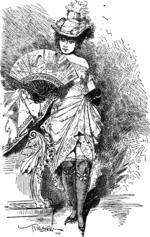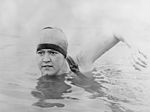This is an essay on the pretension and stupidity of referring to ships as she. It contains the advice or opinions of one or more Wikipedia contributors. This page is not an encyclopedia article, nor is it one of Wikipedia's policies or guidelines, as it has not been thoroughly vetted by the community. Some essays represent widespread norms; others only represent minority viewpoints. |
| This page in a nutshell: Referring to ships as she has at least the redeeming quality of being a potential source of amusement. |
This page is for accumulating amusing passages – real or hypothetical – made possible by referring to ships as she, and for general derision of that pretentious and stupid practice. (Ridicule of other forms of stylistic pretension is welcome as well.) It was inspired by this discussion at WT:MOS (and see also WT:Manual of Style/Archive (ships as "she") for more background).
Queen Elizabeth slipped majestically into the water
[edit]

- (hypothetical)
After Queen Elizabeth broke a bottle of champagne against the ship's gigantic bow, she slipped majestically into the water.
[1] - (from the Featured Article SMS Emden)
During this period, she also served as the escort for Kaiser Wilhelm II aboard his yacht Hohenzollern.
[2]





- (from the article HMS Elk (1804))
Fearing that he might lose the prize if the winds changed, Morris rammed her.
[3] - (from the article HMS Monmouth (1796))
Archibald Dickson raised his flag in her.
[4] - (from the article HMS Indefatigable (1784))
She had a long career under several distinguished commanders.
[5] - (from The Appleton Weekly Post, 1907)
Lusitania does not appear to be so lusty as the Mauretania ... If Lussie doesn't hump herself and do it first she won't be in it with her big sister.
[1]




Into the woulds
[edit]
N.B. There is an appropriate use of the "he would later" form, and that's when taking a temporary jump into the future during an otherwise chronologically linear narrative -- but to be clear, not all such cases justify the "he would later" form. Here's an example (abridged a bit here) from Statue of John Harvard:
The commission weighed heavily on French even as the figure neared completion. "I am sometimes scared by the importance of this work. It is a subject that one might not have in a lifetime," wrote the sculptor—who thirty years later would create the statue of Abraham Lincoln for the Lincoln Memorial—"and a failure would be inexcusable."French's final model was ready the following May and realized in bronze by the Henry-Bonnard Bronze Company over the next several months.
Now, technically "who thirty years later would create" could be rendered as "who thirty years later created", and it's hard to explain why exactly the former form is preferable to the latter, in this particular case. (There might be other appropriate uses as well, but your correspondent just vacuumed the house so he's too pooped to think of any.)[2]
The following examples all lack the key component, found in the above passage, that's required to justify the "he would later" form: a temporary jump into the future. So the woulds get axed:[3]
- "Mel Blanc was the original voice of Bugs and
would voicevoiced the character for nearly five decades." [7] - "Although he did not receive a classical schooling in the Harvard Graduate School, Morgan
wouldwas immediately after his graduationbeappointed to the teaching staff. ... Morgan fell seriously ill on March 15, 1910 while on a trip to New York to visit Daniel B. Fearing, the mayor of Newport, Rhode Island, andwould diedied soon after." [8] - "Gowdy
would later be awardedreceived the Postal Inspector's Award for the successful prosecution of J. Mark Allen, one of 'America's Most Wanted' suspects." [9] - "In 1973 he relocated to Waynesville, North Carolina, where he
would diedied of cancer." [10] - "But Harrison
wouldalso latertelltold him, 'You've got a lovely karma, Vic.' ... Spinettiwould makemade a small appearance in the promotional video for McCartney's song 'London Town' from the 1978 album of the same name. Spinetti's July 2010 performance of the song 'Ob-La-Di, Ob-La-Da', at the Festival Theatre, Malvern in Worcestershire,would later be madewas available on 'The Beatles Complete on Ukulele' podcast. ... Spinetti's film career developed simultaneously; his dozens of film appearanceswould includeincluded Zeffirelli's The Taming of the Shrew, Under Milk Wood, The Return of the Pink Panther and Under the Cherry Moon." [11][12] - "The race
would startstarted with Kyle Busch and Kyle Larson fighting for the lead, but on lap 2 Christopher Bellwould loselost control of his car in Turn 1, butwould save the carmanaged to save it." [13] - "Cecil Beaton, after being fired from American Vogue in 1938, on charges of anti-Semitism, was living in England when his phone rang. Queen Elizabeth, the Queen Mother, who would go on to be his favorite royal subject, wanted to be photographed by him ... Years later, he would sit in Westminster Abbey, high up near the organ pipes, taking photos of Queen Elizabeth II’s coronation with his top hat stuffed with sandwiches." [14] (This illustrates a particular hazard of would-iness, to wit that it can mislead the reader into thinking a habit is being described: "He would sit in Westminster Abbey, high up near the organ pipes, taking photos", like he's stalker or something.)
- "Those who pleaded for clemency for Casement included Sir Arthur Conan Doyle, who was acquainted with Casement through the work of the Congo Reform Association, poet W. B. Yeats, and playwright George Bernard Shaw. Joseph Conrad could not forgive Casement, nor could Casement's longtime friend, the sculptor Herbert Ward, whose son Charles had been killed on the Western Front that January, and who would change the name of Casement's godson, who had been named after him." [15] (What in the hell is that even trying to say?)
- [16]
- [17]
- Big Van Vader would emerge victorious.[18]
- "The Tiddlytubbies would get their own spin-off animated web series in 2018." [19]
- "However, many jumps racing supporters attempted to keep jumps racing at Oakbank and that fight went into the South Australian Court System. ... That would result in an election occurring which the anti-jumps faction winning but debate surrounding that vote spilled into more legal action." [20]
- Farian
wouldlater attempted a failed comeback for the group without Morvan and Pilatus.[21] - While at Vassar, he and fellow future filmmaker, Jason Blum, were roommates (Blum
wouldlater produced Baumbach's first film, Kicking and Screaming in 1995).[22] (This edit and the previous one about Farian are accompanied by the edit summary "He not only would but did". Tongue in cheek because it suggests ignorance of the valid use of the "would" construction in, for example, an account written in an engaging you-are-there tone, but that isn't Wikipedia tone.) - This entire article, with 46 instances of "would", 45 of which were incorrect usage
Closely related constructions include:
Albino Luciani (later to become Pope John Paul I)
[citation needed]The SL-8200 was to compete against the VHS VCRs
.[4]
Misc
[edit]See also
[edit]- Wikipedia:The problem with elegant variation (featured in The New Yorker -- really! [23])
- "Ships—sexist or sexy?", The Signpost, 2014-10-15.
- Explorer weds Titanic widow
- Queen Elizabeth has 10 times the lifespan of workers and lays up to 2,000 eggs a day
References
[edit]- ^ "The Lusitania ..." The Appleton Weekly Post. October 17, 1907. p. 6. Retrieved January 2, 2020 – via Newspapers.com.

- ^ And BTW, this is also one of the very rare cases where a bit of WP:Elegant variation -- "the sculptor" -- is justified, unless the reader can see a not-awkward way of recasting the sentence to avoid it.
- ^ Thanks to our esteemed colleague GuardianH for this felicitous metaphor.
- ^ https://en.wikipedia.org/?oldid=998185328